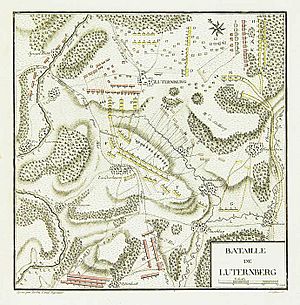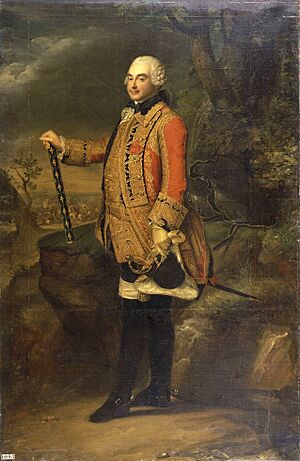Battle of Lutterberg (1758) facts for kids
Quick facts for kids Battle of Lutterberg |
|||||||
|---|---|---|---|---|---|---|---|
| Part of the Seven Years' War | |||||||
 |
|||||||
|
|||||||
| Belligerents | |||||||
| Commanders and leaders | |||||||
| Christoph von Oberg | |||||||
| Strength | |||||||
| 14,000 | 42,000 | ||||||
| Casualties and losses | |||||||
| 3000 to 4000 dead or wounded 800 captured |
600 dead or wounded; | ||||||
The Battle of Lutterberg was an important fight that happened on October 10, 1758. It was part of a bigger conflict called the Seven Years' War. In this battle, a large French army, led by Charles, Prince of Soubise, fought against a smaller group of soldiers from Britain and Germany, led by General Christoph Ludwig von Oberg.
Contents
What Was the Battle of Lutterberg?
The Battle of Lutterberg was a military clash during the Seven Years' War. This war was a huge global conflict. It involved many powerful countries from 1756 to 1763. The battle took place near a town called Lutterberg. This area is now part of Lower Saxony in Germany.
Who Fought in the Battle?
On one side was the French army. They had about 42,000 soldiers. Their commander was Charles, Prince of Soubise. He was a skilled French general.
On the other side was a combined force. These soldiers were mostly from Prussia and other German states. They also had some British support. This group was much smaller, with about 14,000 troops. General Christoph Ludwig von Oberg led them.
What Happened During the Battle?
The two armies met near Lutterberg. The French army was much larger. They used their cavalry (soldiers on horseback) to attack. The French cavalry charged many times. These attacks were very strong.
The smaller Anglo-German forces struggled to defend themselves. They were overwhelmed by the French attacks. Because of this, they had to retreat. They pulled back from the battlefield.
What Were the Results?
The Battle of Lutterberg was a clear victory for the French. They won the battle. However, Prince Soubise was slow to chase the retreating enemy. His leaders in Paris were not happy about this. They decided to replace him. The Marquis de Contades took over his command.
Even though he was replaced, Soubise was honored for his victory. He received a Marshal's baton. This was a very high military rank in France. Another brave soldier, François de Chevert, also received a special award. He was given the Grand Croix for his important actions in the battle.
 | Emma Amos |
 | Edward Mitchell Bannister |
 | Larry D. Alexander |
 | Ernie Barnes |


